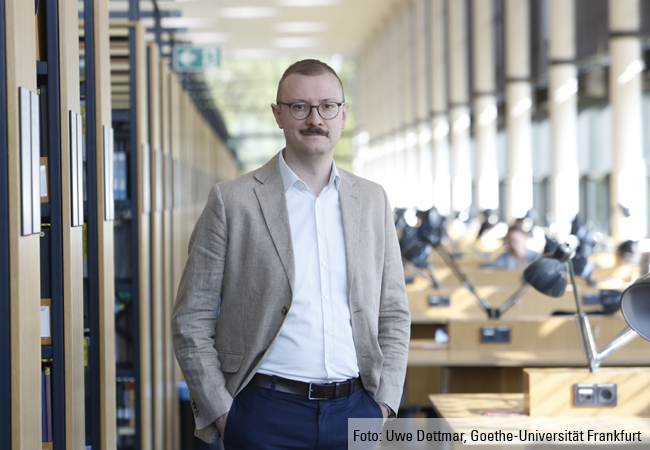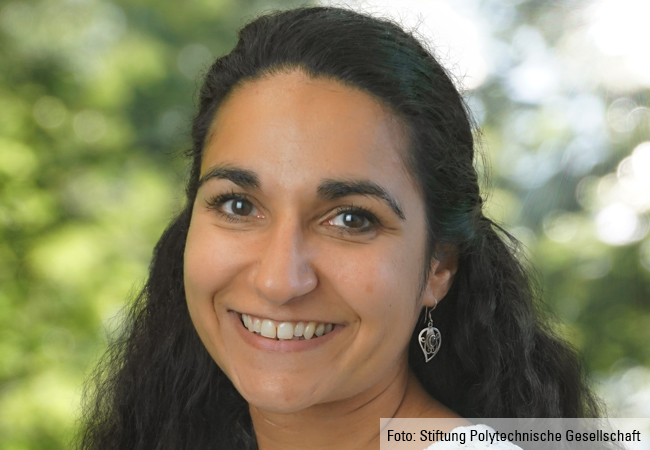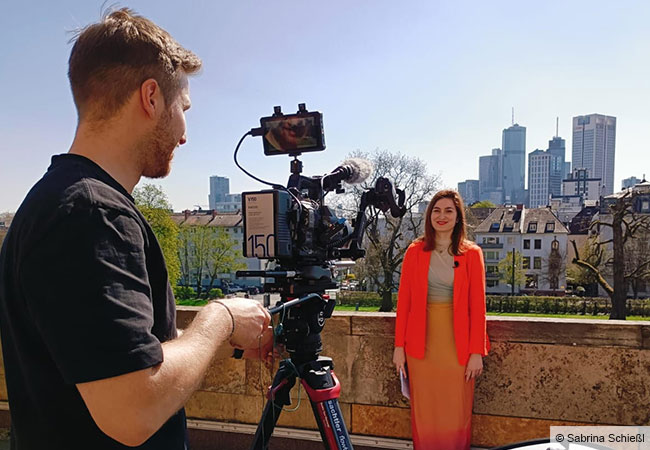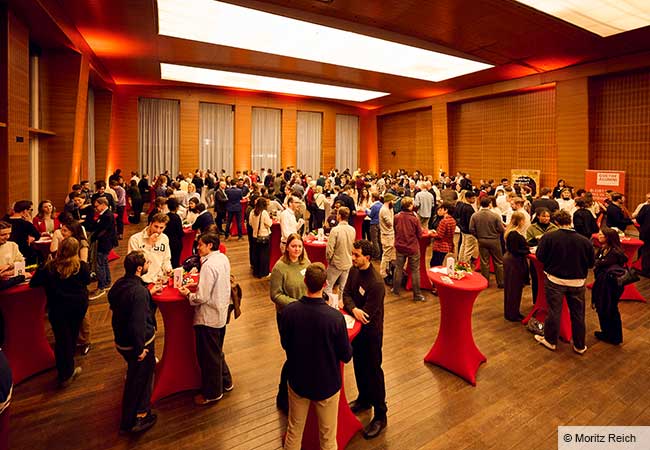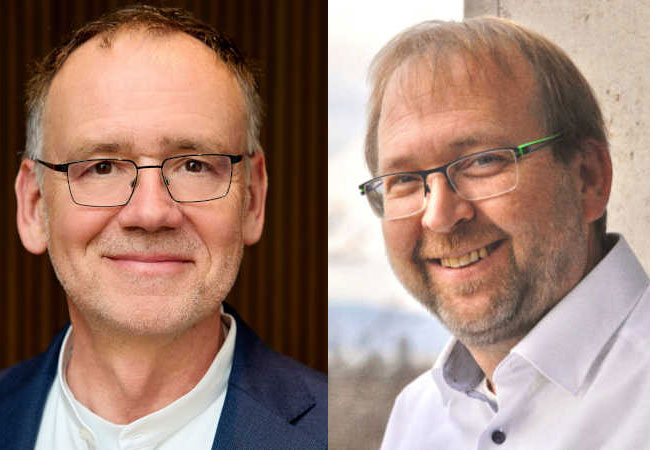Speaking with UniReport, writer, translator and publicist Aris Fioretos reflects on his linguistic home, describes his fascination with Paul Auster and talks about his latest novel, which focuses on the life of an ageing rock musician living in Berlin. He also provides insights into his poetry lectures, which started on June 4.

UniReport: You have Greek roots, grew up in Sweden, and your first language was German. Is there a linguistic home in your literary production, or does it lie more in being multilingual?
Aris Fioretos: Even if I don’t really feel as though I have a geographical home, I’m at home in many places. The same is probably true of the three or four languages in which I feel more or less secure and well-grounded. Twice in my life I’ve considered switching to writing in a different language – much like trains switch tracks. The first time was in the US in the mid-1990s, and the second, a decade later, while I was a resident of Berlin. Both times, however, I decided to stick to Swedish – this, in keeping with the train analogy, “off the beaten track” language that I’ve never been able to regard as “mine.” God, no, the Muses know why. Life would be much simpler if I had stayed on the high-speed rail of American English, or in the InterCityExpress of German. I’m curiously loyal… Believe me, as a writer I would’ve liked to be more opportunistic, or at least less stubborn.
You’ve translated numerous authors into Swedish, including the recently deceased Paul Auster. What about him fascinates you, what value do you see in his novels?
We first met in the late eighties. I was still living on Manhattan’s Upper West Side. My girlfriend and I would often go to “Moon Palace” on Broadway, a restaurant that has long since vanished but was destined to supply the title of one of Paul’s novels. At our first meeting we talked about the two “O’s” in the name. Were they full moons, or a pair of eyes? Or maybe even two halos? Obviously we shared a certain sensitivity for the meanings of words beyond mere semantics – also considering their graphical appearance, the way the letters are arranged, or acoustic coincidences.
Paul had recently moved to Brooklyn. I remember visiting him at his workplace. It was a dark studio of about fifteen, maybe twenty square meters; I don’t think he raised the blinds very often. As is customary in the US, the door to the hallway bore a number and a letter. The studio being on the first floor, its number was 1. And the letter? It just so happened that Paul lived in “I”, making it 1I… “I, one”, “One, I” – the address didn’t seem inappropriate for someone who had already written a lot about being alone.
At the beginning of the nineties, I translated some of Paul’s texts – starting with poems and short pieces of prose, and later The Invention of Solitude and The Red Notebook (abridged version). I felt drawn to his short poetic works in particular – most of all, the main piece from White Spaces – and his memories of his father. Later, when I lived in Baltimore for a time, I actually helped him with a scene in the novella Timbuktu. The main character is a dog, and in one of the chapters he’s wandering along the street where Edgar Allan Poe used to live. Paul wanted to know what the house looked like where the master of American horror had lived, but he was too busy to travel to Baltimore. So, I took one of those disposable cameras that existed back then to document the façade. When he later sent me the novel (I was already living in Berlin), the book had a dedication containing the sentence: “For Aris – who, in effect, wrote the second paragraph on p. 44 – – !” With just ninety words, I had become his co-author.
After moving to Berlin, I gradually lost sight of Paul’s work. We still met up as often as our geographical tracks interchanged – first in “Exil,” the famous restaurant in Kreuzberg, which also no longer exists, later at the homes of mutual friends, and occasionally at readings or festivals. I liked him very much, his attentiveness, his delicate objectivity. Paul remained loyal to the letters, always open to their unexpected adventures.
Your novel The Last Greek, part of a trilogy, is about the fate of a Greek migrant in Sweden. It was published in 2011. Since then the topics of displacement and migration have become increasingly important in Europe, where migration has shifted so to speak from an internal European issue to a global one. What is your assessment of the current situation, also in an immigration country like Sweden?
It doesn’t make me happy, that’s for sure. In the past, year in, year out, Sweden appeared to be successfully preserving its identity as a consensus-based culture. Now we see more frequent indications that we, too, like many other nations before us, are turning into a conflict society. For every political movement in one direction there’s another in the opposite. However, the former appears to be much weaker, and so Sweden, the erstwhile Nordic social utopia, also finds itself slowly but surely drifting to the right.
In democratic societies differences of opinion are not only possible, but generally also beneficial. Yet there’s a new relentlessness in the dissent, which I did not encounter in the past. Some of it, I believe, has to do with resentment – and with parties such as the Sweden Democrats and the backward-looking nostalgia they continue to uphold. If social resources become scarcer, if things no longer seem to be the way they supposedly were “back then”, the search for reasons begins – and these are quickly, sometimes almost automatically, found among immigrants. Today, one fifth of our population is thought to be of foreign origin; so surely it should come as no surprise that, given that resources are finite and questions about their distribution remain, this factor, too, results in tensions.
Until a decade ago, immigration was considered the universal solution to labor market shortages and to ensure care for the elderly, both factors our then Conservative government set out to predict almost down to a T. That goal was just as exaggerated then as today’s critique of it is now. Not all parties are as delusional as the Right when it comes to the alleged Islamification of the West, but even when others address the subject in a cagey or roundabout way, everybody still understands what they mean. Are tougher laws on immigration, asylum, the right to remain in the country, not to mention climate change or Russia’s invasion of Ukraine somehow supposed to be the answer to the challenges of our time? I don’t see how that could remedy the deficits in the education system or the hospitals, and certainly not how it could boost the state’s tax revenue.
The subject of your latest novel The Thin Gods could interest baby-boomers: an aging New York rock musician who lives in Berlin is confronted with his past. Do you have a personal connection to rock music, which in itself has come of age, so to speak? What about it made you choose this popular style of music for a novel?
I recently found my daughter convincing me that her father – yes, really – was definitely a baby-boomer. Until then I had thought, “boomer”? What a stupid name. They’re old folks like Bill Clinton, Maria Furtwängler and Toni Polster. But surely not me? Then I discovered that according to sociologists the term refers to people born between 1945/46 and 1964, putting me firmly inside the group – whether I like it or not. Apart from Paul Auster and a few other friends, I actually have very little in common with people who were born before 1957, 1958. They’re the older people, who, in my experience, have remained world-famous for looking after their own excellence more than anything else. But I have to acknowledge my daughter’s wisdom. Being born into the boomer generation, a boomer baby, how disgraceful for a sixty-four-year-old. Let’s talk about music instead.
In the fall of 1976 when, at age 16, I was extremely angry about the more “ancient” fellows of my boomer generation, there was a program on Swedish radio late on Sunday evenings with the title “At home with.” One evening the two ether-anarchists who made the program broadcast an unknown band from New York. The group was Television, the debut single they had just released was called “Little Johnny Jewel.” I was electrified. I felt as though this was the sound of my internal body tissue, which ensures life between the bones and the skin. The next day, I exchanged Swedish crowns for dollars and sent the money to the unknown label Ork Records. A few weeks later I was the happy owner of a record with a blood-red sleeve. Since then, I’ve listened to Television’s albums thousands of times. Their music was the first to make me realize that art can combine things that I wouldn’t ordinarily have put together: coolness, nerves, transcendency. The novel is my belated thanks to the band.
Looking back at previous Frankfurt Poetics Lectures: Are there any authors that have left a (special) impression on you?
Most of the names are well known to me, some are friends. I’m afraid that none of them has particularly influenced the type of literature I write, but I feel a kind of empathy with them as smart minds and crafty souls. I liked Oskar Pastior very much, we were neighbors for a few years, but he wrote texts that seemed to be from a different planet than mine. Durs Grünbein and I have been friends for thirty years, and now and then this friendship has found its way into publications, and has taken us to the Isle of the Dead off Venice, Ground Zero in New York and the Mojave Desert. But the list of former poetics lecturers whom I regard highly is far too long for me to name them all. I’m honored to now count myself among them – and to be followed by Judith Schalansky, whose “Wildes Wissen” series I applaud.
Can you divulge any of the topics and aspects that will be covered in your poetics lectures?
Hopefully the title, “Solar plexus”, sets out the key points. It will be about a writer’s body. To be more precise, by taking three perspectives I hope to discern how the intense perception of the present, which is triggered by a body lowered into water, is transposed into literature. (I admit I’m a fanatic when it comes to bathtubs.) In the first lecture I’d like to discuss yearning as a precondition for texts. The second will consider hunger as a challenging experience. Finally, the third will be about electricity – nerves, shivering, vibrating – as a way of being both inside and outside oneself. In other words, what makes literature urgent, sensitive, concise? How can words feel like flesh?
Questions: Dirk Frank





